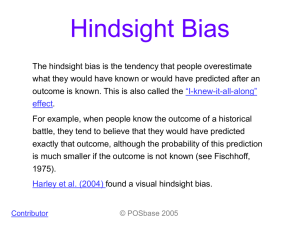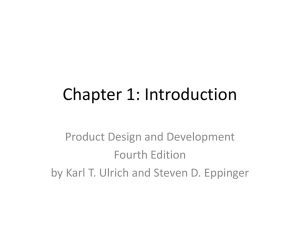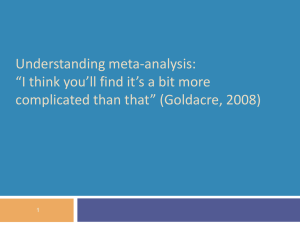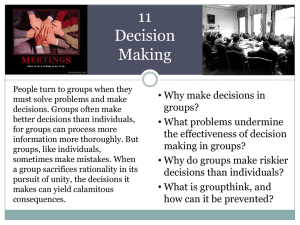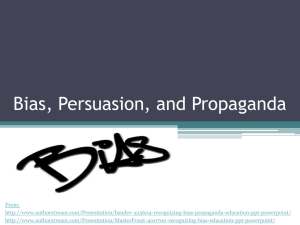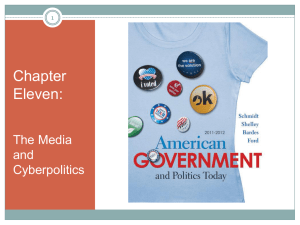the PowerPoint Presentation
advertisement
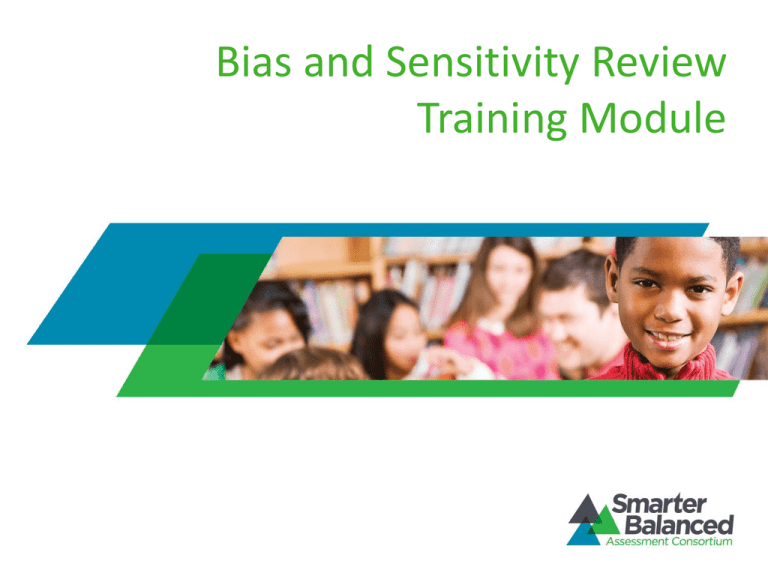
Bias and Sensitivity Review Training Module Overview of Bias and Sensitivity Review Module • • • • • Purpose of bias and sensitivity review Structure and organization of review committee Bias and Sensitivity Guidelines document Revisit bias and sensitivity in the context of assessment Bias and sensitivity issues to consider Purpose of Bias and Sensitivity Review • • • • Quality depends on eliciting appropriate evidence Non-targeted knowledge and skills can reduce quality Universal Design minimizes factors that reduce quality Bias and sensitivity review provides a check on quality of items and tasks Expectation of Committee Members • • • • • • Conduct the review based on the criteria discussed during training Listen to, and collaborate with, other committee members High expectations for quality Provide honest and constructive feedback Focus on issues of content that may trigger bias and sensitivity Be familiar with the Smarter Balanced Bias and Sensitivity Guidelines Bias and Sensitivity Guidelines • Validity and Fairness • • • Barriers to Fairness • • Topics to Treat with Care Fair Topics and Language Topics to be Avoided Representation of Diversity Topics Examined in this Module • Fairness • Topics that are Fair • Topics Treated with Care • Topics to be Avoided • Representation of Diversity How an Item Functions Present Information Interact with Content Stimulate Construct Apply Construct Produce Response Produce Score Make Inference Produce Visible Product of Construct Measure of Construct Statement About Construct Barriers to Valid Measurement Present Information Interact with Content Stimulate Construct Apply Construct Produce Response Quantitative Score Inference Visible Product of Construct Measure of Construct Statement About Construct Inaccurate receiptChallenges Inaccurate or interpretation interacting with production or of stimulus content recording of response Jimmy is the star on his football team. This season he scored ten touchdowns, kicked twenty extra points, and had eight field goals. What is the total number of points Jimmy has scored this season? 104 What is a field goal? Bias • Bias occurs when content contained in an item or task creates an unfair disadvantage for a sub-group of students – Unfamiliar contexts or examples – Unusual names of people or places – References to local events or issues Sensitivity • Sensitivity focuses on content that creates unease, provokes negative feelings, or challenges beliefs or values. – Religions, religious practices, and religious figures – Political topics – Issues of gender, race, ethnicity, and culture Topics and Language • • • Topics that are fair Topics to be avoided Topics to be treated with care Topics Fair to Include • • • • • Topics required by Common Core State Standards Topics to which all students should have been exposed Information that is required for the item and which is presented in the stimulus Topics students with disabilities have been exposed to in the classroom Topics students who are developing English language skills have been exposed to in the classroom Topics to be Avoided Key Questions • • • • Is the word used primarily in a specific region or localized context? Is the topic or term associated with a specific religion? Is the topic associated with a specific trade or occupation? Is the phrase an idiom or figure of speech? Topics to be Avoided • Pregnancy • Contraception • Abortion • Sexual behavior or innuendo • Abuse of people or animals • Murder • Assault • Rape • Torture • Stealing • Witches, ghosts, and vampires • Deportation • Experimentation on people or animals • Killing animals for sport • Suicide • Euthanasia • Gun control • Climate change • Prayer in school • Partisan political issues • Ethnic conflict • Religious disputes Topics Treated with Care Examples • • • • • • • • • Accidents and natural disasters Advocacy Alcohol, tobacco, and illegal drugs Animals that frighten children Antisocial, criminal, or inappropriate behaviors Biographical materials Dangerous activities Death and Dying Evolution • • • • • • • • • • • Family problems Gambling Holidays and birthdays Homelessness and evictions Immigration Junk food Luxuries Medicines and diet supplements Obesity and body-image Slavery Terrorism and war Avoiding Stereotypes • • • • Language Images Social and occupational roles Behaviors and characteristics Appropriate Labels for Groups • • • • • Black or African American Asian American: Refer to nation of origin (e.g., Japanese American, Chinese American) People with disabilities Latino/Latina American Native American or American Indian Representation of Diversity • • • • Males and females equally represented Minority group representation People of different ages, physical abilities, and social classes Variety of life situations Summary of Module • • • • • • • Topics that are fair Topics to be avoided Topics to treat with care Avoid stereotypes Appropriate labels for groups of people Representation of diversity Bias and Sensitivity Guidelines
